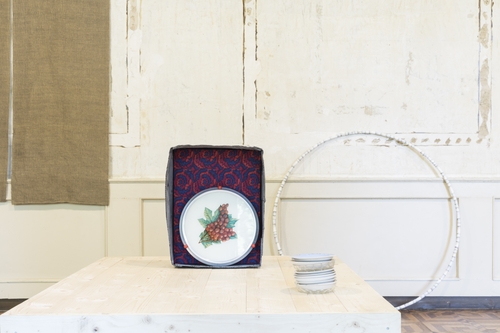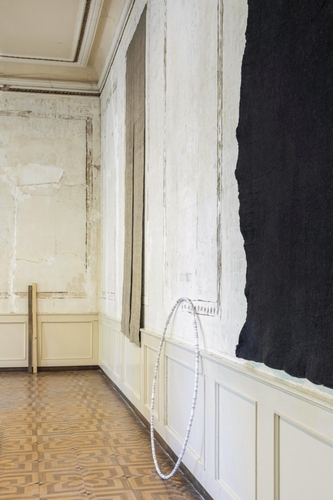REFLECTED POSITIONS
ALICJA KWADE AND NINO KVRIVISHVILI
Kunsthalle Tbilisi at the State Silk Museum, Tbilisi, Georgia
October 25 –November 30, 2019
Opening Reception: Friday, October 25, 7-9PM
Curated by Office for Art, Berlin, Nathalie Hoyos and Rainald Schumacher in collaboration with Irena Popiashvili
The exhibition Reflected Positions – Alicja Kwade and Nino Kvrivishvili brings together two artists, whose works could hardly be more different at first glance. But it’s not only this, the exhibition is also a platform to create a dialogue that extends to considerations about the different conditions of production and of the reception of artistic work in Europe.
Alicja Kwade is interested in the visual reception of reality. Objects that we know as straightforward are bent at once. The hands of a clock tick invisibly behind a mirrored glass. Stone boulders are real or have an identical twin with a chrome finish or painted bronze. Many pieces work with the visual appearance of the real object and the image of the object in a mirror. The work is concentrated on the basics of being in the world, the structure of time and space and the reflection about what is real. What is only imagined and what stays outside of the imagination? Works on paper in the exhibition address the theme that time is based on such an unimaginable concept. Made visible by the positions of the hands of an analogue watch. A burnt down candle is also a symbol of the passing of time. In one work in the exhibition such candles stumps form a circle, an endless repetition of past moments. Another work confronts a simple wooden beam with a kind of sibling, a beam casted in bronze. The works of Alicja Kwade convey a technical perfection. The traces of manual work are hidden behind the perfect surfaces or are fading away in the non-reality of a mirrored image or duplicated object.
Nino Kvrivishvili created for this exhibition a new installation, whose poor and simple materials such as old cardboard boxes, plaster and used wooden crates convey a deep poetic dimension. There is an additional layer of hidden emotions in the found objects like old postcards, Christmas tree decoration, a ceramic plate, a piece of black fur and the used light chains. These pieces whisper and mumble about past moments and suggest stories from times gone by. The colors of the different wooden materials, of the cardboard and of the many gypsum covered surfaces add to such feelings and question how past moments can be valued or remembered at all. Is Nostalgia, as a yearning and transfiguration of the past, appropriate? The installation illustrates this process of dealing with fragments of memory, they are packed in boxes, staged on pedestals as valuable details. The reconstruction of the past remains a fragile construct and nothing can prevent memories from fading over time. Even the objects and images that might carry hidden narratives lose this quality over time and become rubbish of history. The two artistic approaches, their aesthetics and the conditions of production are the two sides of the same coin. Artists have the privilege to work in a field of complete liberty. This freedom allows to develop a highly individual and personal relation to the social and political reality and to life and nature. Both artistic intentions are the reflections of their individual positioning to the world and in such a way signpost to contribute to the understanding of a rather complex and shared reality from the Caucasus region to Central Western Europe.
Nino Kvrivishvili was born in 1984 in Georgia. She studied Textile Design at the Tbilisi State Academy of Art. The artist participated in number of residency programs in Switzerland, Germany and Lithuania. Her recent exhibitions include solo exhibitions at Binz39, Zurich, Switzerland, State Silk Museum, Tbilisi, Georgia and KKKC, Klaipeda, Lithuania.
Alicja Kwade is a German artist of Polish origin. Born 1979 in Katowice, the family moved after the fall of the Iron Curtain to Germany. She studied at the Universität der Künste in Berlin, where she lives and works. Her works are in many private and public collections. At the Venice Biennale in 2017, she showed a large indoor and outdoor installation. The Metropolitan Museum of Art in New York has commissioned her with a sculpture for the Roof Garden, which is on display until October 27, 2019.
For further information and images please contact info@kunsthalletbilisi.com or Tel.: +995 599331157











